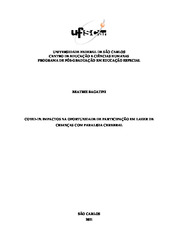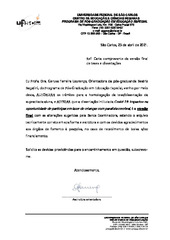| dc.contributor.author | Bagatini, Beatriz | |
| dc.date.accessioned | 2021-04-24T13:23:32Z | |
| dc.date.available | 2021-04-24T13:23:32Z | |
| dc.date.issued | 2021-02-26 | |
| dc.identifier.citation | BAGATINI, Beatriz. Covid 19: impactos na oportunidade de participação em lazer de crianças com paralisia cerebral. 2021. Dissertação (Mestrado em Educação Especial) – Universidade Federal de São Carlos, São Carlos, 2021. Disponível em: https://repositorio.ufscar.br/handle/ufscar/14175. | * |
| dc.identifier.uri | https://repositorio.ufscar.br/handle/ufscar/14175 | |
| dc.description.abstract | In 2020, the World Health Organization declared that there was a pandemic due to the SARS-COV-2 virus, which caused social isolation, restricting people's access to community environments. In view of this, the importance of understanding the changes in leisure and routine activities of children with cerebral palsy was seen, since they were not attending school in person. That said, the present study aims to compare the leisure activities of children with cerebral palsy before and during the period of social isolation, through specific objectives: a) map the leisure activities of children with cerebral palsy before and after the pandemic by Covid-19; b) to identify the participation of children with cerebral palsy in leisure activities; c) to identify possible changes in the routine of children with cerebral palsy caused by social isolation. For this, three mothers / guardians of children with cerebral palsy, aged 33 to 70 years, who had already been involved in a study conducted in 2018, participated in the study, which answered an interview, the PEM-CY questionnaire, and the PEDI. Except for PEDI, all instruments were reapplied in 2020, with adaptations, and a socioeconomic questionnaire was added. The method is characterized as longitudinal descriptive, and the data of the interviews were analyzed from the thematic analysis of the content and the questionnaires followed their own instructions. Two initial classifications were obtained from the interviews, resulting in 13 nuclei of meaning until reaching 14 themes to be presented and discussed. The results indicated that children with cerebral palsy had changes in leisure participation, and routine activities due to the covid-19 pandemic. Community activities were impaired, in home activities, there was no difference before and during social isolation, however, children spend more time at home and miss the school and the fun that the space offers. The pandemic also led to changes in routine, changes in mood and family life. Thus, the study concluded that the covid-19 pandemic had an impact on the leisure activities of children with cerebral palsy also on other aspects of their daily life. It was concluded that the impacts of social isolation were significant for the children in the study, which requires attention in view of the opportunities in the leisure area that children with CP have compared to children with typical development. | eng |
| dc.description.sponsorship | Coordenação de Aperfeiçoamento de Pessoal de Nível Superior (CAPES) | por |
| dc.language.iso | por | por |
| dc.publisher | Universidade Federal de São Carlos | por |
| dc.rights | Attribution-NonCommercial-NoDerivs 3.0 Brazil | * |
| dc.rights.uri | http://creativecommons.org/licenses/by-nc-nd/3.0/br/ | * |
| dc.subject | Educação Especial | por |
| dc.subject | Isolamento social | por |
| dc.subject | Lazer | por |
| dc.subject | Paralisia cerebral | por |
| dc.subject | COVID-19 | por |
| dc.subject | Special Education | eng |
| dc.subject | Social isolation | eng |
| dc.subject | Leisure | eng |
| dc.subject | Cerebral palsy | eng |
| dc.title | Covid 19: impactos na oportunidade de participação em lazer de crianças com paralisia cerebral | por |
| dc.title.alternative | Covid 19: impacts on the opportunity of participation in leisure of children with cerebral palsy | eng |
| dc.title.alternative | Covid 19: impactos en la oportunidad de participación en el tiempo libre de niños con parálisis cerebral | spa |
| dc.type | Dissertação | por |
| dc.contributor.advisor1 | Lourenço, Gerusa Ferreira | |
| dc.contributor.advisor1Lattes | http://lattes.cnpq.br/1474728505225459 | por |
| dc.description.resumo | No ano de 2020 foi declarado pela Organização Mundial da Saúde que havia uma pandemia pelo vírus SARS-COV-2, o que ocasionou o isolamento social, restringindo o acesso das pessoas a ambientes comunitários. Em vista disso, viu-se a importância de entender quais as mudanças nas atividades de lazer e de rotina das crianças com paralisia cerebral, uma vez que não estavam frequentando presencialmente a escola. Dito isso, o presente estudo tem como objetivo comparar as atividades de lazer de crianças com paralisia cerebral antes e durante o período de isolamento social, através de objetivos específicos: a) mapear as atividades de lazer de crianças com paralisia cerebral antes e depois da pandemia da Covid-19; b) identificar a participação das crianças com paralisia cerebral em atividades de lazer; c) identificar possíveis mudanças na rotina das crianças com paralisia cerebral causadas pelo isolamento social. Para isso, participaram do estudo três mães/responsáveis de crianças com paralisia cerebral, com idades de 33 a 70 anos, que já haviam se envolvido em estudo realizado em 2018, para o qual responderam uma entrevista, o questionário PEM-CY e o PEDI. Com exceção do PEDI, todos os instrumentos foram reaplicados em 2020, com adaptações e, ainda, com acréscimo de um questionário socioeconômico. O método se caracterizou como descritivo longitudinal, os dados das entrevistas foram analisados a partir da análise temática do conteúdo e os instrumentos seguiram suas próprias instruções. Obteve-se das entrevistas duas classificações iniciais, derivando em 13 núcleos de sentido até alcançar 14 temas apresentados e discutidos. Os resultados indicaram que as crianças com paralisia cerebral tiveram alterações nas atividades de lazer, participação e rotina devido à pandemia da Covid-19. Tiveram as atividades comunitárias prejudicadas; nas atividades em domicílio, não houve diferença antes e durante o isolamento social, no entanto, as crianças passaram mais tempo em casa e sentiram falta de frequentar a escola e da diversão que o espaço oferece. A pandemia também acarretou mudanças na rotina, alteração de humor e convivência familiar. Com isso, o estudo conclui que a pandemia da Covid-19 impactou nas atividades de lazer de crianças com paralisia cerebral também em outros aspectos da rotina a convivência social além da condição de saúde física em si. Pode-se concluir que os impactos do isolamento social foram significativos para as crianças do estudo, o que requer atenção tendo em vista as oportunidades na área de lazer que as crianças com PC têm em comparação às crianças com desenvolvimento típico. | por |
| dc.publisher.initials | UFSCar | por |
| dc.publisher.program | Programa de Pós-Graduação em Educação Especial - PPGEEs | por |
| dc.subject.cnpq | CIENCIAS HUMANAS::EDUCACAO | por |
| dc.description.sponsorshipId | CAPES: Código de Financiamento 001 | por |
| dc.publisher.address | Câmpus São Carlos | por |
| dc.contributor.authorlattes | http://lattes.cnpq.br/6542194978153509 | por |


